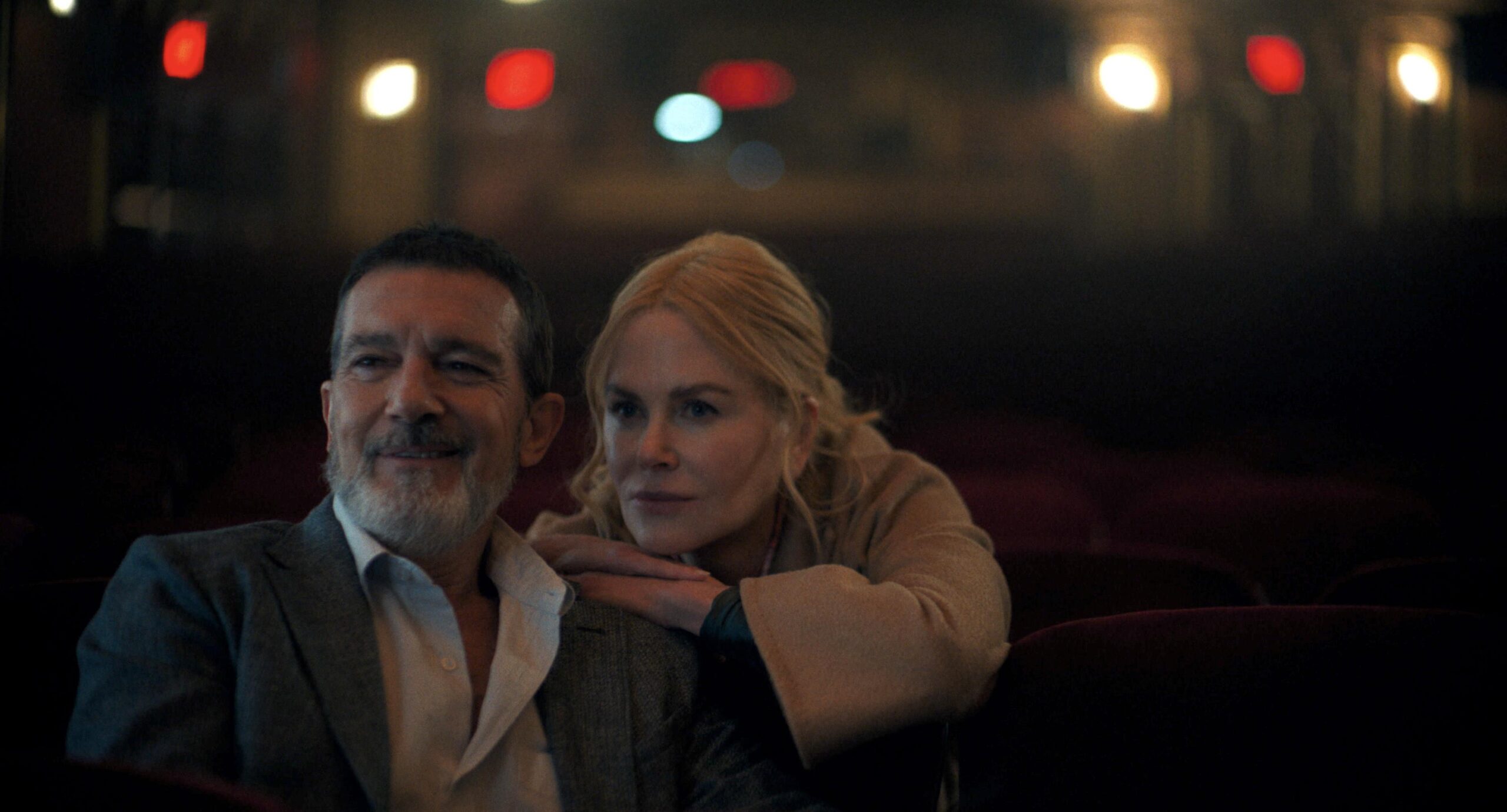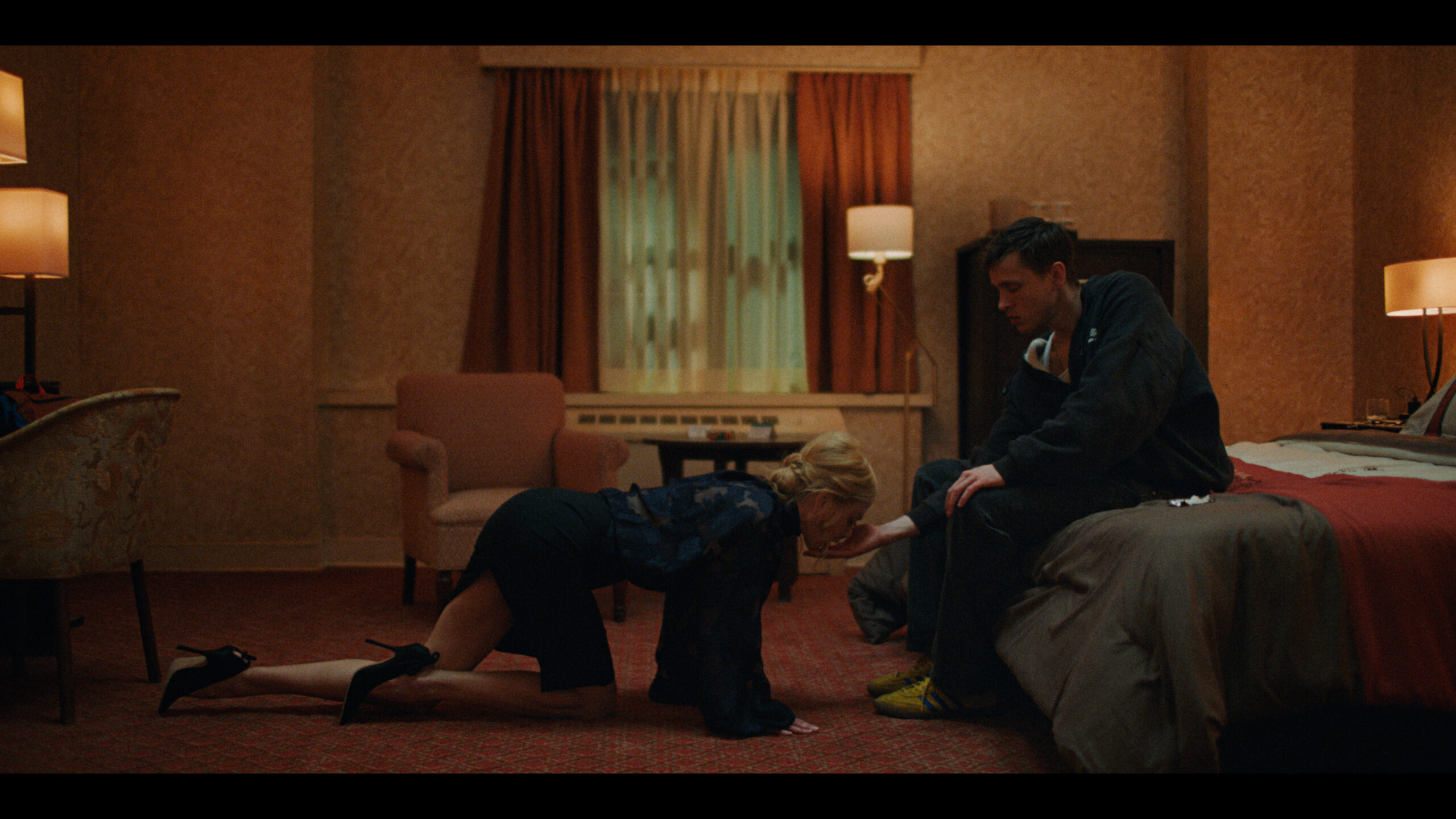Want to hear more from the actors and creators of your favorite shows and films? Subscribe to The Cinema Spot on YouTube for all of our upcoming interviews!
Managing editor & film and television critic with a Bachelor's of Arts in English Literature with a Writing Minor from the University of Guam. Currently in graduate school completing a Master's in English Literature.
These past few years have been fantastical for renowned Australian-American actor, Nicole Kidman. Following her tragic role in Robert Eggers’s The Northman and appearances in iconic AMC Theatres commercials, the performer teams up with Dutch filmmaker Halina Reijn for a last-minute present for this year’s festivities. What better way for A24 than with a ’24 erotic thriller, too?! On some movie-goers’ highly anticipated watchlists, Reijn’s drama film, Babygirl, crawls on all fours at a different pace than her horror-comedy feature, Bodies Bodies Bodies. Good (and even great) erotic thrillers can be difficult to come by, and the writer-director momentarily flips the subgenre on its head. As shown in its promotional trailers, Babygirl remarkably reverses the femme fatale and the submissive “fall guy” sexual archetypes. Simultaneously, Reijn seemingly returns to the spicy erotic thrillers of the late 20th century, such as Fatal Attraction and Basic Instinct, in the collective visual flair.
Babygirl is written and directed by Halina Reijn.
In this review, I will discuss Halina Reijn’s Babygirl. As this article’s title suggests, no spoilers will be present.
A24’s Babygirl Synopsis
According to A24 Press, here is the official synopsis for Halina Reijn’s erotic thriller drama film, Babygirl.
A high-powered CEO puts her career and family on the line when she begins a torrid affair with her much younger intern.
A24 Press
Discussion
Although not perfect, Reijn’s erotic thriller is an entertaining film led by its hot star power. The younger demographic might indulge themselves in Tensile intern, Samuel (Harris Dickinson), who has an odd Carmy Berzatto build. More so, the filmmaker successfully directs an upper-class married couple, Romy (Kidman) and Jacob Mathis (Antonio Banderas). The casting and the screenwriting are not major issues per se, and the narrative beats maintain a fine pacing. Yet, Reijn confines this whole narrative within Romy Mathis’s immediate ecosphere, keeping Jacob and their daughter, Isabel (Esther McGregor), and even assistant Esme Smith (Sophie Wilde) limited in their secondary roles.
On the one hand, Babygirl is expected to be seen as a sincere, severe take on libidos and sexual dynamics from a feminist lens. Romy makes some effort to experiment with Jacob when they try to have intercourse, to little effect. On the other hand, the film borders on black comedy in that her consistent attempts to have sex with Samuel behind closed doors—literally—are naturally laughable. Samuel often acts as the dominating other, but under that mask is immaturity, clueless of what he himself desires.
Personally, the pristine nature of Babygirl lies in the director of photography Jasper Wolf’s cinematography, production designer Stephen H. Carter’s set pieces, and frankly, the musical components and the collaborative work on Romy Mathis’s appearance throughout.
The (S)imp of the Perverse
It is noteworthy that Romy Mathis and Samuel fully understand the consequences of their unity—their age gap, professional and class disparities, and more. It’s as if the former heeds to the devil on her shoulder urging her to act on instincts. This idea possibly comes from concepts like Edgar Allen Poe’s “The Imp of the Perverse”, in which individuals act on their self-destructive impulses knowing full well that they should not in the first place. In theory, this applies perfectly to Mathis and the world in which she lives.
Somewhere in the first half of the film, there is interesting imagery of a dead skunk fished out of a pool. The symbolism of an animal tampering with the waters for the risk of everybody’s detriment is ever-present. Mathis and Samuel constantly have (barely) furtive flings, affecting those in the workplace, at home, and even themselves. Workplace relations are obviously strictly prohibited. However, knowing so and committing to one anyway is an audacious path. The two characters venture down this route, and somehow the resolution is not as harsh as one would anticipate. Nonetheless, the results concern Mathis’s ethos more than any other rhetorical appeal.
Moreover, Halina Reijn’s erotic thriller is an intelligent story centered on the protagonist’s ecosphere and the different spaces she occupies. As a chief executive officer of an automation company, the character is at the top of the economic hierarchy, a woman leader in a field primarily dominated by men. She refers to herself as a collaborator and a nurturer, labels more likely designated to matriarchs. Ironically enough, she secretly needs to be guided and given answers.
Boundaries and Space
Mathis doesn’t allow many people to take up her space, represented excellently in the opening scene. Here, sex with her husband in the bedroom is contrasted to silently masturbating to pornography on her home office floor. It isn’t that this woman is reserved. Rather, due to her role as a CEO, Mathis can tell employees what she wants—a cup of coffee during work hours—but cannot express her needs and desires. When she eventually confides in Samuel about her genealogy within the workplace and how it molds her personality, she also describes her exact relationship to power.
Reijn has a recurring aspect where Mathis and Samuel engage in closeness in a small conference room, an elevator, a rooftop, etc. She hints at the shared usage of space from how Samuel takes over a scene from Mathis or vice versa, e.g. when Samuel takes up seventy-five percent of a hotel bed. Wolf’s camera captures these intimate moments to exhibit the exploitation of fantasy. Additionally, intimacy coordinator Lizzy Talbot helps take the actors and the audience into a surreal sexual world, one in which sexuality itself isn’t so sexualized.
In his MIT Press text, The Agony of Eros, South Korean-German cultural theorist Byung-Chul Han writes of fantasy: “Thresholds and transitions are zones of mystery and riddle—here, the atopic Other begins. When borders and thresholds vanish, fantasies of the Other disappear too” (41). He explains that boundaries separate the rich from the lesser fortunate, and space does not define these essential differences. Whenever Samuel crosses a line or a line is threatened, Babygirl loses that “thrilling” element and simply becomes a window into eroticism.
Power Politics
Whenever Mathis and Samuel take up space together, their Master-Slave dialectic—or in terms explained before, the dominant and the submissive—is on full display. In his critical text, Introduction to the Reading of Hegel, Russian-French philosopher Alexandre Kojève writes:
Alexandre Kojève, ‘Introduction to the Reading of Hegel’, pp.14-15, 19-20
[T]he Master’s ‘truth’ is the Slave and the Slave’s Work. Actually, others recognize the Master as Master only because he has a Slave; and the Master’s life consists in consuming the products of slavish Work, and in living on and by this Work. … The complete, absolutely free man [then] will be the Slave who has ‘overcome’ his Slavery. … The Master can never detach himself from the World in which he lives, and if this World perishes, he perishes with it.
Likewise, in her micrographia, In Praise of Risk, French psychoanalyst Anne Dufourmantelle writes of the Slave’s truth as easily being used against the Master. She writes: “Everything is a matter of consent, or of refusal. This is our responsibility, to say yes or no. [Passion is] espousing a movement that dispossesses and reveals you at the same time” (18). As an intern, Samuel can work for higher-ups and fetch coffee, which is his job after all. Reijn explores the power politics between him and Mathis as an erotic exchange. Samuel can leave his internship and work elsewhere. However, Mathis needs him so that their shared path does not lead to a publicized scandal, the film’s biggest stake.
An End-of-Year Excitement
Composer Cristobal Tapia de Veer’s soundtrack consists of exhilarating waves of instrumentals, from the choir-like vocals as Mathis prepares for work, to the scoring as she undergoes a variety of therapeutic procedures, to the nightclub music heading into the climax, to the ethereal music as Mathis drives to her family’s country home, enveloped and filled with Christmas lighting.
Music editor Missy Cohen helps play some song selections in scenes to enhance the atmosphere of ethos and pathos between Romy and those closest to her. The instant stops when a scene cuts to the next hit hard, almost to strike a strong chord for the viewing experience. Music supervisor Meghan Currier helps curate some ecstatic song selections, including “Never Tear Us Apart” by INXS and “Father Figure” by George Michael. These selections are quite telling, especially in how they mold an extra layer around Mathis and Samuel.
Costume designers Kurt and Bart and hair and makeup artist Noriko Watanabe do splendors at giving Mathis her look. Kidman stuns in every outfit—the dark floral dress that comes across “like a dead fish” and her tenebrous dress—and wears her hair in such a manner that showcases sophistication while still letting loose a bit. The actor is assertive in appearance, but Mathis also takes off this mask to convey that she, too, seeks for that missing piece inside of her.

The Crew Behind Babygirl
Jasper Wolf (Bodies Bodies Bodies) serves as the director of photography.
Niko Tavernise serves as the stills photographer. Sarah Shatz is the additional stills photographer.
Matthew Hannam (Antiviral, It Comes at Night, Possessor, The Iron Claw) is the film’s editor.
Cristobal Tapia de Veer (Black Mirror Series 4 finale—“Black Museum”, Smile, The White Lotus, Smile 2) scores the soundtrack. Meghan Currier (The Skeleton Twins, Bodies Bodies Bodies, Past Lives, Hit Man) serves as the music supervisor.
Missy Cohen is the music editor. Eric Strausser is the sound effects editor.
Avy Kaufman (Brokeback Mountain, Scream 4, The Skeleton Twins, It Comes at Night, Luca Guadagnino’s Suspiria, Tár, Rustin) serves as the casting director.
Daniel Frankel serves as the casting associate. Nathan Francis is the casting assistant.
Chris and John Cenatiempo (Southpaw, The Get Down, No Hard Feelings) serve as the film’s stunt coordinators.
Lizzy Talbot (Alice Birch’s Dead Ringers, No Hard Feelings, Jonathan Nolan and Lisa Joy’s Fallout, Bridgerton) serves as the intimacy coordinator.
Aesthetics
Stephen H. Carter serves as the production designer.
Molly Mikula serves as the art director. Elsa Rinde is the assistant art director.
Sarah McMillan is the set decorator.
Kurt and Bart (Deadpool 2, Black Adam, The Crow remake) serve as the costume designers.
Anouck Sullivan serves as the makeup department head. Mara Palumbo is the key makeup artist.
Mandy Lyons serves as the hair department head. Mallory Pace is the key hairstylist.
Noriko Watanabe is the hair and makeup artist for Romy Mathis.

The Cast of Babygirl
Nicole Kidman (Batman Forever, Eyes Wide Shut, Paddington, The Killing of a Sacred Deer, Aquaman, The Northman) portrays Romy Mathis, the titular protagonist and the CEO and founder of Tensile.
Harris Dickinson (The King’s Man, Triangle of Sadness, The Iron Claw) plays Samuel, an intern at Mathis’s company.
Antonio Banderas (Interview with the Vampire, Desperado, the Spy Kids franchise, the Shrek and Puss in Boots franchise) portrays Jacob Mathis, Romy’s husband of nineteen years.
Sophie Wilde (Talk to Me) portrays Esme Smith, Romy’s assistant and junior leadership coordinator at the company.
Esther McGregor portrays Isabel Mathis, Romy and Jacob’s older daughter. Vaughan Reilly plays Nora Mathis, Romy and Jacob’s younger daughter.
Gabrielle Policano plays Mary, Isabel’s girlfriend.
Gabriela Torres, Izabel Mar, and Max O’Herlihy play other interns.
Tess McMillan appears as Ophelia, a girl with whom Isabel has a fling at the Mathis country home.

Performances and Character Developments
As Romy Mathis, Kidman preserves her slim, fine wine-aged personality. However, the character is not solely defined by her exterior physicality. Babygirl‘s official A24 press notes cite the actor as being most immersed in her role, and rightfully so. Mathis possesses a repressed sexual identity, not quite understand what fulfills her. Hence, Reijn constantly juxtaposes the protagonist’s personal sphere with her professional and social spheres. Kidman gets freaky in the role albeit not in a manner that enters bondage, discipline, dominance, submission, and sadomasochism (BDSM) territory. Reijn subtly paints Romy Mathis as a sensual woman, aroused by specific touches, smells, and tastes, like what she does with an accessory of clothing.
In the role of Jacob Mathis, Banderas is a sweet foil to Kidman’s Romy. His job as a theater director is not highlighted as much. This is perhaps because the men are not intended as the focal subjects. The actor shows that rougher side of himself seen in Desperados or Puss in Boots, and this still works to a tee. Banderas performs as great as usual, sweet at times and pained when the conflict calls for it.
Similarly, Kidman finds another foil in fellow Australian actor, Sophie Wilde. As Esme Smith, Wilde is a loyal assistant archetype who takes a different route to discover her power. Smith plays by rules and knows her place, but she is also a small reminder of who Mathis set out to be. Thirdly, Mathis is juxtaposed with her queer daughter, Isabel, whose young adult relations mirror her own. Although, I would have loved it if Reijn explored that more. Instead, viewers see Mathis too inside of her head about her wants, needs, and desires to be asking what those are in other people.
Final Thoughts on Halina Reijn’s Babygirl
Halina Reijn’s Babygirl is hilariously kinky, visually alluring, and decently developed. The plot contains its highs and lows but makes up for the minuscule flaws in the overall presentation. Romy Mathis’s lifeworld is not completely defined due to the spaces she exists in. Somehow, it proves feasible because her family and friends are also human. It isn’t a Christmas movie but rather a movie set around Christmas. Reijn’s most meaningful gift lies in the fact that love comes in various forms. Who knew that an alternative means to take down a CEO was through seduction?
4.5/5 stars
Babygirl is now playing in theaters!
For more drama and thriller-related news and reviews, follow The Cinema Spot on Facebook, Twitter, Instagram, and Bluesky! Also, follow us on Letterboxd for further feature film, short film, and limited series reviews!
Managing editor & film and television critic with a Bachelor's of Arts in English Literature with a Writing Minor from the University of Guam. Currently in graduate school completing a Master's in English Literature.





One Comment on “Halina Reijn’s ‘Babygirl’ (A24) Non-Spoiler Review – An Erotic Film Playing Into Power And The Perverse”